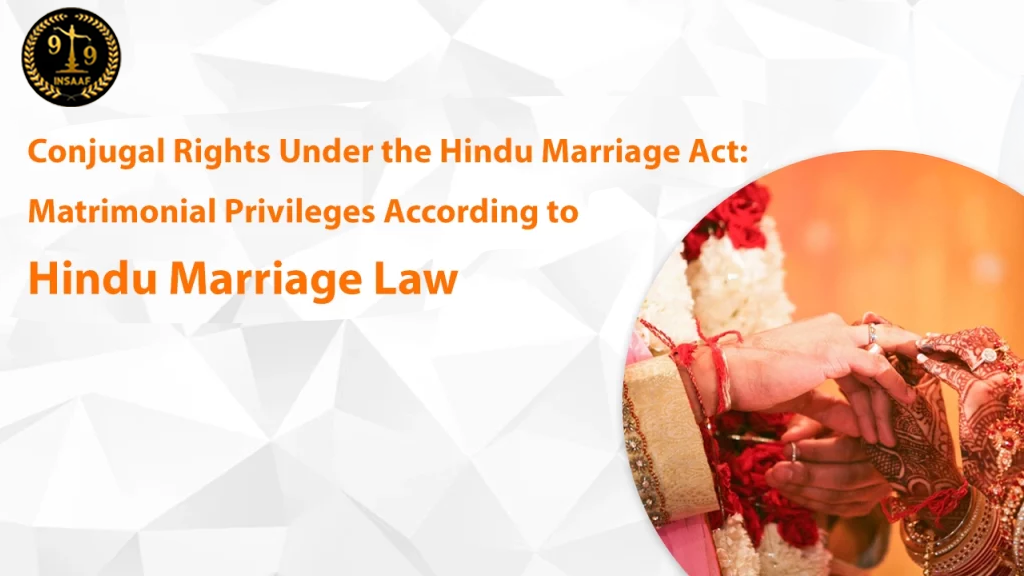

Online Legal Advice from Insaaf99® Online Lawyer Consultation in India


Online Legal Advice from Insaaf99® Online Lawyer Consultation in India

Marriage, a sacred bond uniting two individuals in a lifelong partnership, encompasses various aspects, including conjugal rights. The Hindu Marriage Act of 1955, a seminal legal framework governing Hindu marriages in India, addresses these aspects. A notable provision within this act deals with "Conjugal Rights" and the "Restitution of Conjugal Rights." The "Restitution of Conjugal Rights" is a legal recourse available to either spouse when the other spouse declines to live together or engage in sexual relations. It allows a legal remedy for the aggrieved party to seek the resumption of their conjugal relationship.
In the marital life governed by the Hindu Marriage Act, conjugal right emerge as a fundamental thread. These rights weave together a spectrum of commitments and privileges that spouses mutually owe in the sacred bond of matrimony. These rights encompass the sacred entitlements of companionship, cohabitation, intimate union, and the profound responsibility to provide unwavering emotional and physical support. The essence of conjugal right's is to maintain the emotional and physical well-being of both partners in the sacred union of marriage.
Under the Hindu Marriage Act, of 1955, the following are considered to be conjugal rights:
In marriage, discord can sometimes rear its head when one partner refuses to fulfill their conjugal duties. This can lead to disputes that echo through the sacred bonds of matrimony. However, the Hindu Marriage Act, in its wisdom, provides a legal remedy to navigate this delicate situation. Section 9 of the Act ushers in the concept of "Restitution of Conjugal Rights."
Restitution of Conjugal right's is akin to a legal chess move, open to initiation by either spouse who senses their partner's unwarranted withdrawal from the matrimonial haven or a denial of their rightful conjugal dues. This provision is a powerful tool, compelling the estranged partner to return to the conjugal dwelling and recommence the delicate dance of marital obligations.

To initiate the process of seeking restitution of conjugal right's, the aggrieved spouse must take the proactive step of filing a formal petition in the family court. Once this legal action is set in motion, the court springs into action by dispatching a summons to the other spouse, summoning them to appear before the court.
If, regrettably, the summoned spouse chooses not to grace the court with their presence or stubbornly resists complying with the court's orders, then the court, in its wisdom, may proceed to grant a decree of restitution of conjugal right's.
Filing a Petition: The process commences with the aggrieved spouse taking the pivotal step of filing a formal petition in the appropriate family court. This petition is the official plea to the court, requesting the restitution of conjugal rights.
Establishing Grounds for Relief: The petitioner, in the course of legal proceedings, must substantiate their case by showcasing that their spouse has withdrawn from the matrimonial union without a reasonable and justifiable cause, thus failing to fulfill their essential marital duties.
Court Intervention: Once the petition is filed, the court, in its role as a mediator, endeavors to facilitate reconciliation between the estranged parties. If these well-intentioned efforts towards reconciliation prove fruitless, the court then reserves the right to issue a decree mandating the restitution of conjugal right's.
Dealing with Non-Compliance: In the event that the respondent spouse obstinately refuses to adhere to the court's decree, the court holds the authority to prescribe necessary measures aimed at enforcing compliance. It's worth noting, however, that the enforcement process can be intricate and multifaceted.
Insaaf99, an online legal consultation platform, plays a pivotal role in facilitating the process of Restitution of Conjugal Rights under the Hindu Marriage Act. This platform connects individuals seeking legal advice with experienced family law attorneys and experts.
For individuals facing issues related to the denial of conjugal right's, Insaaf99 offers the following benefits:
Legal Expertise: Users can consult with seasoned family law professionals who can provide guidance on initiating and navigating the restitution of conjugal rights process.
Document Assistance: Insaaf99 assists in the preparation of the necessary legal documents and petitions required to file a case in the family court.
Mediation and Counseling: The platform may also offer mediation and counseling services to promote reconciliation between spouses before pursuing legal action.
Online Support: Users can access legal advice and resources from the comfort of their homes, making it convenient for those facing marital issues.
In summary, Insaaf99 simplifies the process of seeking legal recourse for restitution of conjugal right's, ensuring individuals have access to expert guidance and support throughout the legal proceedings.
In conclusion, conjugal right's hold a pivotal place within the framework of the Hindu Marriage Act. This legal doctrine not only safeguards these rights but also extends a legal recourse to those spouses who find themselves unjustly deprived of them. It is incumbent upon married couples to comprehend these provisions, promoting a harmonious and gratifying matrimonial journey. Additionally, having awareness of the legal remedies at their disposal in times of marital discord is of paramount importance. The Hindu Marriage Act's emphasis on conjugal rights underlines the enduring significance of preserving the institution of marriage within Hindu society.